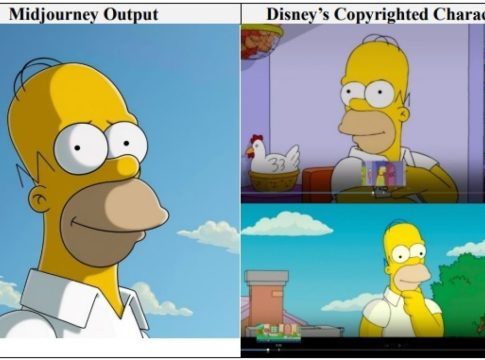Hollywood Takes a Stand Against AI: Disney and Universal Sue Midjourney for Copyright Infringement
In an unprecedented legal action within the entertainment industry, major players such as Disney and Universal have filed a lawsuit against AI image generation company Midjourney. This move, which marks a pivotal moment in the ongoing tensions between traditional copyright law and rapidly evolving AI technologies, sheds light on the complexities surrounding content creation in the digital age.
The Claims Against Midjourney
Filed in a U.S. district court in Los Angeles, the 110-page lawsuit illustrates the plaintiffs’ grievances with detailed appendices, including side-by-side comparisons of copyrighted characters and the AI-generated outputs in question. Disney and Universal assert that Midjourney has unlawfully utilized "countless" copyrighted works to train its AI, thereby enabling it to produce unauthorized replicas of beloved characters and settings.
Notable figures like Homer Simpson, Shrek, and even Darth Vader are mentioned in the suit, highlighting the breadth of the alleged infringements. Midjourney, which boasts approximately 20 million registered users, is accused of offering an "artificial intelligence image-generating service" that functions similarly to a vending machine, dispensing endless unauthorized reproductions of iconic intellectual properties.
The Broader Context
This lawsuit follows a trend where various industries are increasingly contesting the role of AI in creative fields. News organizations, music companies, and stock image platforms have all initiated legal proceedings against AI firms for similar concerns. Examples include The New York Times suing OpenAI and Microsoft, and Getty Images pursuing legal action against Stability AI. However, the involvement of major Hollywood studios introduces a significant layer to this ongoing debate.
Implications for the Future of AI
As AI-generated content becomes more prevalent, the intersection of copyright law and artificial intelligence is becoming a critical area of focus. The lawsuit seeks unspecified damages and aims to restrict Midjourney from launching a planned video service without adequate copyright protections in place. This underscores the urgent need for clarity in regulations governing AI technologies and their applications.
What’s Next?
Midjourney has yet to issue a public response to the lawsuit, but the outcome could have far-reaching consequences for the AI industry and content creators alike. If successful, this legal action could set a precedent that influences how AI companies train their models and what safeguards they must implement to protect existing intellectual property.
As the landscape of digital creativity continues to evolve, this development serves as a timely reminder that while technology offers exciting possibilities, it must coexist with established legal frameworks that protect artists and their work. The resolution of this case could pave the way for a more defined relationship between AI innovations and copyright laws, shaping the future of both industries involved.

Writes about personal finance, side hustles, gadgets, and tech innovation.
Bio: Priya specializes in making complex financial and tech topics easy to digest, with experience in fintech and consumer reviews.

